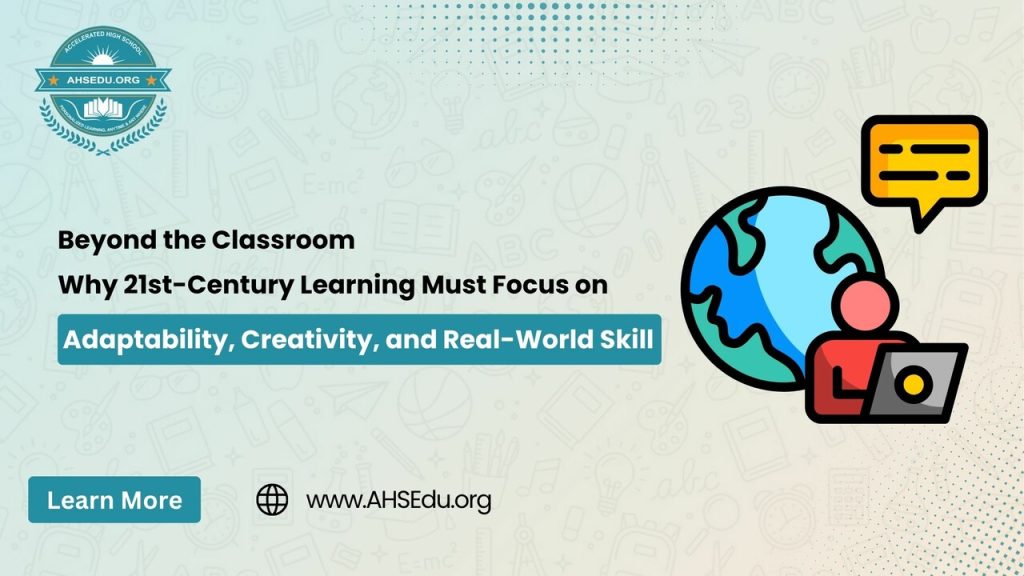
We live in a world where the rules change fast. Technologies evolve, job markets shift, and new challenges emerge. In that context, the old model of schooling, where students memorize facts and recite them on exams, increasingly falls short. What children need today is not just knowledge, but the ability to think, adapt, and create.
That’s where 21st-century skills come in: adaptability, critical thinking, creativity, self-learning, collaboration, and digital literacy. These are the “how” tools we all need to navigate an uncertain future. In this article, we’ll look at the gap between what traditional schools teach and what the world demands, examine education models that are closing that gap, and show how AHS Education integrates those principles to empower students from anywhere.
The Gap Between School and the Real World
Traditional schooling prioritizes content coverage: reading, writing, arithmetic, history. These are vital foundations, but the pace of change now demands more. According to The Future of Jobs Report 2025, the skills most in demand are exactly those that go beyond rote learning: adaptability, complex problem solving, creativity, and digital fluency. 
Moreover, the skills gap, the mismatch between what students know and what employers need, is growing. The World Economic Forum warns that millions of workers will require retraining, emphasizing analytical and creative thinking. 
In short: content is not enough. Students must also learn how to learn, adapt, and think deeply.
What Are 21st-Century Skills?
Here’s a breakdown of some essential skill categories that students need:
• Adaptability & Growth Mindset: navigating change and learning from failure.
• Creativity & Innovation: generating new ideas or approaches.
• Critical Thinking & Problem Solving: analyzing, connecting, and finding solutions.
• Collaboration & Communication: working with others and explaining ideas clearly.
• Digital Literacy & Technology Awareness: using tools responsibly and effectively.
• Self-Regulation & Metacognition: planning, reflecting, adjusting, and self-monitoring.
These aren’t “extras” — they are central to thriving in a rapidly shifting world. The OECD’s Future of Education and Skills 2030 framework emphasizes not only what students know but how they use knowledge.
Why Traditional Methods Fall Short

Even in well-resourced schools, many conventional practices limit development of these skills:
• Uniform pacing forces all students to progress in lockstep, even though some may be ready to advance and others need more time.
• Overemphasis on memorization leaves little room for inquiry, project work, or experimentation.
• Rigid curricula make it hard to deviate or explore deeper questions.
• Test-driven teaching pushes teachers to “cover” rather than foster curiosity.
Because the world no longer rewards only recall, students trained in that model often struggle to apply knowledge to new problems.
Models That Are Getting It Right
Several countries and systems have redesigned their classrooms to emphasize deeper thinking and adaptability:
• Finland uses project-based learning: students tackle real-world issues through collaborative inquiry rather than isolated subjects.
• Singapore integrates “thinking routines” that scaffold students’ meta-cognitive awareness — helping them think about their thinking.
• Estonia starts coding and computational thinking early, making digital fluency part of the core curriculum.
• Challenge-Based Learning (CBL) in various regions encourages students to pose big questions, research, test, and reflect — much like scientists or innovators do in real life.

These models show that when students are empowered to explore, reflect, and experiment, both their passion and mastery improve.
How AHS Education Bridges the Gap
AHS doesn’t just digitize textbooks. It incorporates these 21st-century principles into every aspect of its platform. Here’s how:
• Self-paced, interactive curriculum: Students consume video lessons, answer quizzes, and use worksheets on their own schedule — allowing them to master before moving on.
• Adaptive and scaffolded learning: Concepts build on prior knowledge, enabling personalized growth and preventing gaps.
• Insights through dashboards: Parents, tutors, and teachers see where a student excels or struggles — enabling targeted support.
• Offline & mobile access: In places with limited connectivity, students can continue learning anytime, anywhere.
• Encouraging reflection and retry: Students can re-watch lessons, reattempt quizzes, and reflect on their learning patterns.
Through these design elements, AHS nurtures not only what students know, but how they engage, analyze, and evolve.
What This Means for Each Stakeholder
• Parents: You don’t have to pick between standards-based content and deeper thinking. AHS offers both, giving your child the tools to adapt and the structure to succeed.
• Schools: Use AHS alongside your core curriculum to differentiate instruction, free up teacher time, and push students toward higher-order thinking.
• Non-profits & NGOs: In resource-limited settings, AHS’s no-cost, offline-first model empowers children with real learning agency.
• Tutors: Focus less on creating material and more on guiding thinking — AHS delivers content, you deliver mentorship.
Conclusion
Education must evolve. Memorization alone no longer prepares children for a world of change and complexity. We need learning that fosters adaptability, curiosity, creativity, and intentional thinking.
AHS Education is built to close that gap. It offers more than content, it provides learning experiences that grow thinkers and doers, not just test-takers.
If you agree that education should prepare children for life (not just exams), join us:
• Parents & Guardians → AHSEdu.org/demo-for-parents
• Schools & Institutions → AHSEdu.org/demo-for-institute
• Non-profits → AHSEdu.org/demo-for-nonprofit
• Tutors → AHSEdu.org/demo-for-tutor
Let’s shift education from memorizing to mastering, from reciting to reasoning, and from surviving to thriving.

AHSEDU.org offers personalized learning for every student. With a curriculum standardized with USA State Standards, Free interactive videos, Fun and interactive learning content, Constructive assessments, and take-home worksheets we address the unique educational needs of each learner to ensure success.